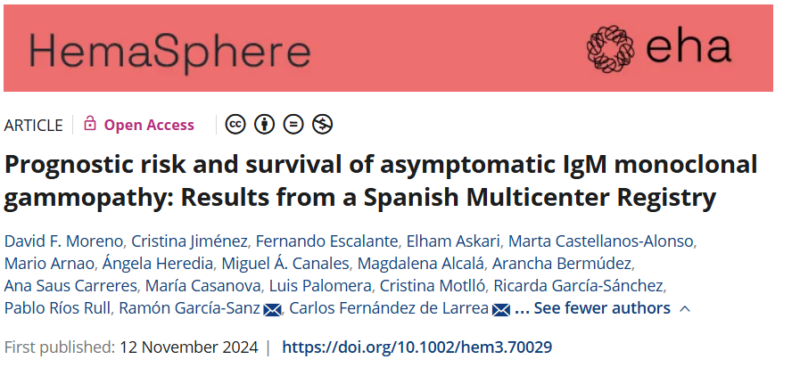Robert Orlowski shared a post on X:
“Myeloma Paper of the Day: Spanish study of IgM MGUS finds cumulative incidence of progression 13% and 20% at 5 and 10 years, serum IgM ≥10 g/L, BM infiltration ≥20%, β2-microglobulin ≥3 mg/L, albumin <4 g/dL most potent progression predictors.”
Authors: David F. Moreno, Cristina Jiménez, Fernando Escalante, Elham Askari, Marta Castellanos-Alonso, Mario Arnao, Ángela Heredia, Miguel Á. Canales, Magdalena Alcalá, Arancha Bermúdez, Ana Saus Carreres, María Casanova, Luis Palomera, Cristina Motlló, Ricarda García-Sánchez, Pablo Ríos Rull, Ramón García-Sanz, Carlos Fernández de Larrea.

More posts featuring Robert Orlowski.
Robert Orlowski, M.D., Ph.D., holds multiple positions at The University of Texas MD Anderson Cancer Center, including Chairman, Ad Interim Director of Myeloma, and Professor of Medicine in the Departments of Lymphoma/Myeloma and Experimental Therapeutics within the Division of Cancer Medicine. Additionally, he chairs the SWOG Barlogie/Salmon Myeloma Committee, which is part of the National Clinical Trials Network, dedicated to advancing new therapies and understanding the biology of myeloma.
Dr. Orlowski’s expertise lies in both clinical practice and scientific research, with a particular focus on translating laboratory discoveries into effective treatments for patients. He investigates drug resistance mechanisms in myeloma and seeks to identify predictive biomarkers for treatment response. Notably, his past contributions include leadership roles in developing proteasome inhibitors like bortezomib and carfilzomib, as well as monoclonal antibodies such as daratumumab and elotuzumab.


